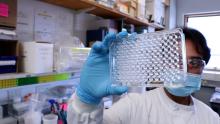Sea Turtles: Harbingers of Oceanic Health
Topsail Island, at 26 miles (41 kilometers) long and 500 to 1,000 feet (150 to 300 meters) wide, is an ideal place for a retreat with its beautiful shorelines and fishing sites. The small island located in the State of North Carolina, United States, is also known, to a lesser degree, to be one of the few nesting grounds in the country for sea turtles.
“Look, there’s another one!”
Helping to Fight the COVID-19 Pandemic with Artificial Intelligence
As we navigate the COVID-19 pandemic, it is clear that having the right tools and technology to fight infectious diseases is at the forefront of healthcare innovation priorities. In times like these, we have seen that it is vital to act quickly to mitigate consequences to human populations, the economy, and the ecosystem.
GoGreen Project: University Studies Environmental Psychology in Young People
“Young people’s attitudes and behavior will dictate the future shape and look of our societies,” said the United Nations Secretary-General, António Guterres, in 2021. It is now more evident than ever before, that we need to change our habits and behaviors to successfully adapt to ecological crises. And to ensure that evidence-based solutions in this sense are effective, we need to consider diverse contexts.
Improving the Lives of Immigrants: Brazilian University Takes the Lead
Several thousand people from different parts of the world, particularly the Latin America and Caribbean region, live in Brazil due to their countries’ social, political, and economic crises. Just as an example, according to a 2021 study from the World Bank and the United Nations High Commissioner for Refugees, Venezuelan adult immigrants in Brazil are 64% less likely to be working in a formal job.
Research to Counter Health Threats: Preparing for Future Pandemics
In the wake of the COVID-19 pandemic, which led to unprecedented health, societal and economic consequences, a European Union (EU) Horizon 2020-funded research project on Pandemic Preparedness and Response (PANDEM-2) is putting considerable efforts into ensuring we are better prepared for future health threats.
Keeping the 'Turtle Island' Alive: The Mohawk’s Fight Against Industrial Pollution
According to the Mohawk, an Indigenous tribe based in North America, the Earth as we know it used to rest on the back of a gigantic turtle – and after the continents separated, North America was known as “Turtle Island”. While the inhabitants of the Island, be it people, other animals or plants, basically live in harmony, if balance was not maintained in the environment, the “creator” would help recalibrate.
University in Slovakia Expresses Solidarity by Aiding Ukrainians
The University of Ss. Cyril and Methodius, a member institution of the United Nations Academic Impact (UNAI) in Slovakia, responded quickly to the armed conflict in Ukraine by mobilizing students, university staff, and faculty. The university is located in the city of Trnava, less than 500km from the border with Ukraine.
Romanian University Becomes Major Hub for Supporting Ukrainian Refugees
“Nearly 4.9 million people have been displaced by the ongoing hostilities in Ukraine, including more than 3 million who have fled across international borders,” warned a situation report published by the United Nations on 16 March 2022 - these numbers continue to rise as the invasion and destruction in Ukraine continue.
Learning From the World’s Largest COVID-19 Treatment Trial: University of Oxford Leads RECOVERY
According to the COVID-19 Weekly Epidemiological Update published on 15 March 2022 by the World Health Organization, “as of 13 March 2022, over 455 million confirmed cases and over 6 million deaths have been reported globally.” This exemplifies how the COVID-19 pandemic has been and continues to be a significant healthcare challenge. And yet, it has also inspired an exceptional response from researchers worldwide.
Promoting Youth Leadership in Water Governance
As countries and regions around the world face the negative effects of climate change and an increasing demand for water resources, the need for appropriate water governance grows day by day. Worldwide, one in three people do not have access to safe drinking water, two out of five people do not have a basic hand-washing facility with soap and water, and more than 673 million people still practice open defecation. The impacts of COVID-19 make it more urgent for securing clean water for everyone, as access to water, sanitation and hygiene services is fundamental to fighting the virus.










